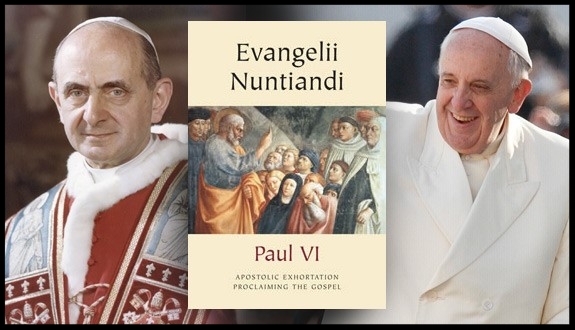In the Fall of 1974, just a few short months after my ordination to the priesthood, Pope Paul VI held one of the important post-conciliar synods, bringing together episcopal leadership from around the world to reflect on the critically important theme of ‘evangelization’ in the Church today. The following year, Paul VI, issued his Apostolic Exhortation, Evangelii Nuntiandi,that presented a marvelous theological rationale for rediscovering this important gospel dynamic in our contemporary church.
The words, “evangelist”, “evangelize”, “evangelization” were somewhat late in becoming part of our Catholic faith vocabulary. In fact, if we Catholics would have used these terms 40 years ago, I’m sure someone might have questioned how truly Catholic we might be! Those were Protestant words to describe what Protestants do! We Catholics were far more comfortable with words like sacrament, commandments, sanctifying grace and hierarchy. Yet, the words “evangelize” and “evangelization” are an important part of our heritage of faith. These words speak to a fundamental and essential dynamic of what it means to be Catholic in our world.
These words speak of the dynamic that could characterize what we have been hearing about in our first readings on the Sundays of the Easter Season taken from the Acts of the Apostles - the spirit filled action of the early church as it “shared with passion” the good news of Christ with others.
That good news - rooted in the life and ministry of Jesus was now given the ultimate stamp of legitimacy through his resurrection. The good news that proclaimed the unconditional love of the Father made real in the presence of the Anointed one - the Messiah.
In the power of his resurrection, Jesus has now given his followers a mission. That mission is to be the living presence of his on-going Good News to the world. In other words, the Lord empowered them and us to be a community of “evangelization”, handing on the legacy of his good news to every generation throughout the world.
But how do we do this? God’s word this day gives us an insight as to how we can carry on this legacy of being “evangelizers” to our world today.
First, in our reading from Acts, Cornelius was attracted to the Good News because he saw something in Peter and the early Christian community that he himself wanted. There was an irresistible attraction in the words that Peter spoke and the life of the community that touched his heart with the presence of the Lord. Quite simply, evangelization occurs when people see the Lord alive and active in the midst of our parish communities -when people see and experience “good things” happening in our midst.
Second, that which attracts people within our parish communities is not so much talk about God but rather the love of God manifested in the quality of our lives lived together. Actions do indeed speak louder than words - It is through the dynamism and power of love that most people come to see the face of God in our world. When a Christian community is divided by factions, jealousy, envy and detraction it becomes a stumbling block rather than a doorway leading to the presence of the living God in our midst. Yet, when that same community struggles to feed the poor, offer compassion to the outcast, reverence the most vulnerable in our midst and struggles to live the law of love - then we evangelize in the most profound way by putting a human face on the love of God.
Finally, we sometimes think that evangelization is always for someone else. It is only when we humbly acknowledge that evangelization must begun with “me”- with ourselves - that our lives can indeed become a witness to the Gospel of Christ. The life long journey of every Christian in realizing that perfection is really a matter of daily conversion - a daily acknowledgment that without God in our lives and the daily struggle to make the Lord the number one priority of our lives, we will never experience the “joy” that St. John spoke of in today’s Gospel - a joy that is complete.
May our reflection on God’s Holy Word this day continue to deepen our commitment to be a people where the Good News of Christ is alive and well because it can be seen and experienced in our love for one another.
